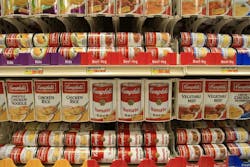Campbell Testing Service to Deliver Soup to Customers’ Doors
As part of an effort by the 148-year-old food giant to shake off a sales slump and update its business model, Campbell Soup Co. is testing an online service that will deliver soups to customers’ doors.The company will begin a pilot test of the program next month, shipping out premium soups that consumers can heat up at home.
In a separate effort, Campbell is developing “crafted” soup with local ingredients that are sold in glass containers, a nod to the growing popularity of mason jars.
It’s all part of a push to overhaul the way Campbell does business, according to Mike Paul, a vice president tasked with leading “disruptive innovation” at the company. Campbell has a problem to solve: Grocery shoppers have been gravitating to the outer perimeter of supermarkets, where the fresh food is typically kept. That’s been bad for canned soup and other so-called consumer-packaged goods, which are stocked in the middle of stores.
“As a company, our goal is to reinvent the center of the store -- which includes soup but it’s much more,” Paul said. “My team is really interested in challenging the conventional CPG model and experimenting with how products are developed, how brands are born and how we go to market.”
Campbell has already made forays into e-commerce. Its chili macaroni and chicken noodle are some of the best-selling soups on Amazon.com Inc.’s website. But the test project would attempt to forge a direct link with shoppers, setting the stage for customers to browse for canned soups on Campbell’s website and have them shipped from its warehouses to their front doors.
Seeking Growth
Paul’s team was set up to operate like a startup within Camden, N.J.based Campbell, a company in need of rejuvenation. It hasn’t posted quarterly sales growth since 2014, and efforts to offer more fresh food have largely fallen flat.
Campbell also is under more pressure following the takeover of Whole Foods by Amazon, a deal that fueled pessimism about large food companies and their ability to adapt to consumer tastes. On the day the transaction was announced, Campbell and other grocery players saw their stocks tank. Its shares have fallen a total of 19% this year.
Campbell has made previous attempts to broaden its image. In July, the company announced a $700 million deal to buy Pacific Foods of Oregon, which makes organic soup and broth. It also invested $10 million in the meal-kit startup Chef’d earlier this year. Through that partnership, Campbell has started touting recipes that feature its products.
Local Movement
With the new crafted-soup test, the idea is to use ingredients from New Jersey and Pennsylvania -- near where the company is based. It’s an attempt to adapt to millennials’ taste for fresher, locally sourced ingredients.
Selling the product in glass jars would echo a strategy embraced by other packaged-food companies. General Mills Inc.’s Yoplait brand recently debuted a yogurt called Oui that’s offered in a glass pot.
Campbell’s earlier efforts at renewal haven’t all gone smoothly. The company’s carrot-farming operations, which it acquired in the 2012 purchase of Bolthouse Farms, have weighed on results.
Paul’s team is hoping to start fresh with a series of small-scale projects -- then see what works.
“We work on early-stage development,” he said, “with a test-and-learn mindset.”
By Mark Gurman and Craig Giammona
About the Author
Bloomberg
Licensed content from Bloomberg, copyright 2016.
